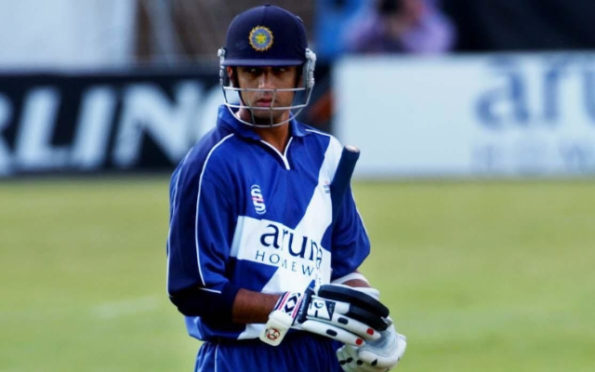Even now, 17 years later, I’ve never forgotten the impression that Rahul Dravid made when he arrived in Scotland to play for the Saltires.
There was a major media scrum when the Indian maestro checked in at Edinburgh Airport on May 12 and he responded with typical grace and good humour to being asked all manner of questions – including one from an STV reporter who asked what he thought about Scottish football.
Never before had the summer sport witnessed the kind of scenes which heralded his arrival. Returning war veterans, Olympic gold medalists, Karen Gillan or Lewis Capaldi might have routinely attracted such a phalanx of photographers, but never a cricketer in a land of supposed unbelievers.
But there again, as somebody fortunate enough to be allowed to shadow Dravid for the next few months, his voyage of discovery was instructive, considering he had little idea of the passion for the game which existed north of the Border.
The Scottish public was equally keen to meet the man whose career spanned 164 Test matches and who accumulated 13,288 runs, at an average of 52.31, while adding another 10,000-plus on the ODI circuit.
No sooner had he touched down than it emerged I would be capturing his thoughts on a weekly basis and charting his impressions as he toured the country and plied his trade for the Saltires in the Totesport League. An intelligent character, he was determined to investigate his subject properly and it wasn’t too difficult to convey his love for cricket.
Indeed, he showed his professionalism to the maximum extent when he took part in Scotland’s tussle with Pakistan in Glasgow on a glorious June day – and was dismissed first ball, as the crowd at Hamilton Crescent groaned in dismay.
Even the most phlegmatic of individuals could have been forgiven for indulging in a strop, and I imagined that approaching Dravid might resemble interviewing Colin Montgomerie after he had missed the cut in a major or getting Graeme Souness to offer a scintilla of praise to Paul Pogpa.
But instead, Dravid was determined to accentuate the positives of the situation and move on. “These things happen in cricket, and you never get airs and graces in this game.
“Of course I am disappointed, but you can’t dwell on what you can’t change. It was a terrific ball and it deserved a wicket”.
With which, he moved on to highlighting the improvements he had detected in the Scottish team, who came within one wicket of upsetting a strong Pakistan line-up.
He was nicknamed The Wall, given his obdurate refusal to surrender his wicket cheaply. Yet, if he had simply been a cold calculating machine, he would never have made such an impact in his domain. In an age when too any sporting stars tended to regard their fame and fortune as a God-given right, Dravid was one of the game’s humble heroes.
Predictably, he starred with the bat, and made a habit of swatting sixes into the tennis courts at The Grange in Edinburgh, whilst fulfilling a hectic schedule of commitments to sponsors and Cricket Scotland, as he toured the length and breadth of the country with his wife.
“Rahul has to be considered not only one of the finest players of his generation, but one of the finest ambassadors the sport has ever seen,” said the former Scotland captain, Craig Wright.
“It was an absolute privilege to play alongside him and to have somebody of that calibre representing the Scottish team [he was ranked number 1 in the world around the same time] was a huge boost to the sport in this country.
“He was a truly great player and a man of real resilience, from whom we all learned a lot. He learned from me as well….about how to operate a washing machine!”
Dravid confessed, at the outset of his magical mystery tour, that he had scant knowledge of cricket throughout Scotland, but soon grew to appreciate the popularity of a pursuit, which has been played north of the Border since the 18th century.
Towards the end of his sojourn, he said: “I had not remotely imagined I would meet so many passionate, enthusiastic people, but the response has been amazing, from eight-year-olds to 80 year-olds.
“The talent definitely exists for Scotland to advance on the global stage. But it is just as important that you cherish the game and keep encouraging the grassroots.”
Nearly two decades later, the message is, if anything, even more crucial as cricket’s lockdown continues.
